The Night Porter, 1974, directed by Liliana Cavani, screenplay by Liliana Cavani, story by Barbara Alberti, Liliana Cavani, Italo Moscati, and Amedeo Pagani.
About halfway into The Night Porter, one character says (of therapuetic "trials," of which more later), "the more shock value they have, the more effect they have." This is advice that Liliana Cavani seems to have taken to heart. And The Night Porter certainly has shock value. But I don't think it has much effect.
The film is set in 1957 Vienna. Charlotte Rampling plays Lucia, a wealthy young woman touring Europe with her conductor husband.
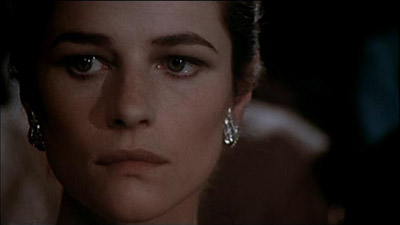
As you can tell from her expression, all is not well. Following the logic of melodramas, the happy couple stop at a hotel where Lucia's former lover, Max (Dirk Bogarde), is working as a night porter. Scenes of high emotion and tension ensue.
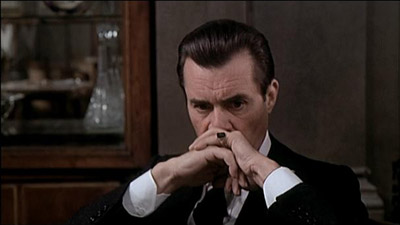
The initial premise is actually very similar to Casablanca (of all the hotels in all the towns in all the world, Lucia had to walk into Max's). But if Rick could tell Ilse that they'd always have Paris, all Max can offer is Mauthausen. Here's their love at first sight, seen in flashback:
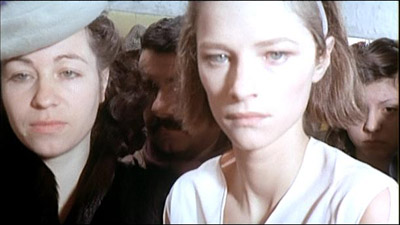
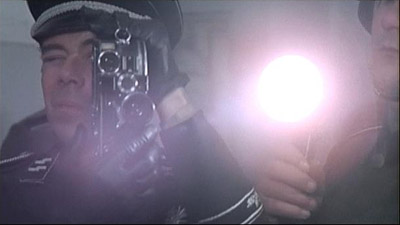
As we learn from the flashbacks, Max and Lucia had a sadomasochistic relationship while she was an inmate and he a warden; when they meet again, they pick up where they left off. This isn't a bad idea for a movie; as Roger Ebert noted:
I can imagine a serious film on this theme—on the psychological implications of shared guilt and the identification of the slave with the master—but "The Night Porter" isn't such a film.
The reason The Night Porter fails is that it is nearly completely lacking in details and characterization. The script treats its two leads so superficially that their actions seem meaningless. All we know about Lucia is that she was the daughter of a socialist and hence not necessarily Jewish, steering away from the more interesting relationship between Amon Goeth and Helen Hirsch in Schindler's List. Lucia rarely speaks throughout the film, and despite Charlotte Rampling's expressive face and eyes, we barely know her. We see a little bit more of Max, but despite Dirk Bogarde's best efforts, he doesn't add up to a complete person. At times, he is a tittering monster, the kind of man who gives his lover a severed head in a box because, as he later puts it (laughing as though he has just told an amusing story at a party), "I couldn't resist!"
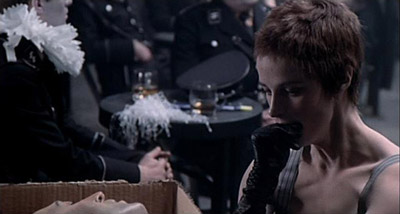
But for a man willing to recount such flamboyant violence, Max also ruthlessly protects his past—he kills a collaborator who could tie him to Lucia. He lives under an assumed name in Austria, apparently planning to fade out into the sunset "hidden away like a church mouse." We're asked to take him seriously when he says that he works nights because "I have a sense of shame in the light." That's a little hard to square with the fact that he keeps his SS dress uniform hanging in his closet, armband and all:
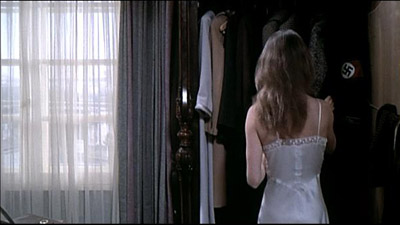
The end result is a shambling cartoon whose behavior seems motivated only by whatever emotion the film is trying to provoke at any given moment. Again, you could make a serious movie about the mixture of shame and pride that an ex-Nazi ("officers of the finest corps of the Third Reich," as one character puts it) would feel. But this is not that movie. I hate to say it, but Apt Pupil has more moral seriousness.
The inconsistant and poorly drawn characters at the film's center would be enough to ruin The Night Porter. But I haven't even touched on the film's most ridiculous aspect. Max belongs to a sort of ex-Nazi support group that meets and holds mock trials for its members, presenting all the evidence and witnesses against them before burning the evidence and murdering the witnesses. Here's how one member describes their aim:
We must try to understand if we are victims of guilt complexes. If so, we must be freed of them.
I can buy the idea of a group of ex-Nazis dedicated to destroying all evidence that links them with their pasts. But only in the 70's could someone make a film that asks audiences to accept a Nazi Feelgoodery aimed at curing the century's greatest murderers of their neuroses.
But suspend disbelief and allow the filmmakers their Nazi support group. Now ask yourself: what would the leader of such a group look like? Remember, one of their goals is not to be publically denounced as Nazis. Furthermore, one of the leader's duties is sneaking documents out of the records of the War Crimes Commission and the War Documentation Center. So close your eyes and imagine the kind of anonymous-looking man who could easily smuggle original documents out of these places. Got it? Now take a look at Klaus:
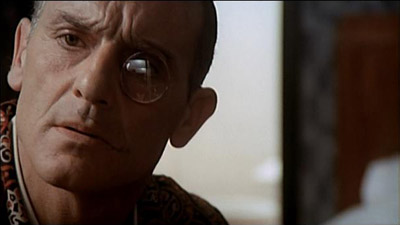
Again, remember: The Night Porter wants us to take it seriously, even as it asks us to believe that a group of Nazis in hiding would be led by a man who looks like Colonel Klink. Lest you think I chose that still unfairly, here's Klaus again, wandering around 1957 Austria in an outfit from 1944 Berlin:
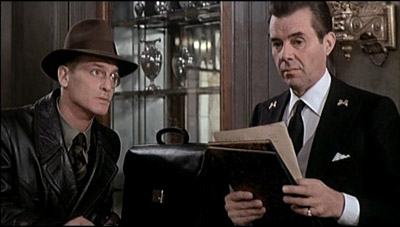
If Bogarde isn't meeting his eyes, I suspect it's so he can keep a straight face. And even if you forgive the scar, forgive the black leather jacket, forgive the fedora, forgive the monocle, consider this: Klaus can't even be bothered to wear the monocle in the same eye.
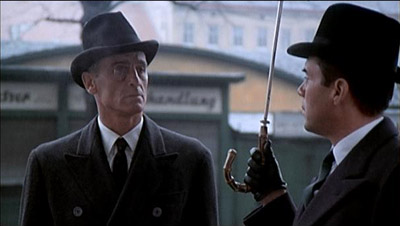
That's not a reversed negative; both coats are buttoned left-over-right and the lettering in the background is correct. Worse yet, Klaus isn't even the campiest Nazi. That title goes to Bert, who as a young man danced ballet for the amusement of the SS:
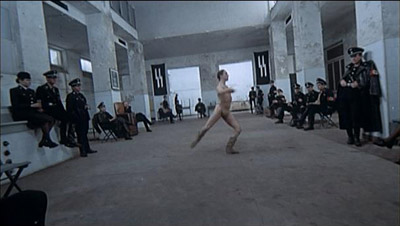
If you still think the movie has any link with reality, ask yourself, what exactly is happening in this scene? Where is this empty room, where ballet is performed under SS banners and a photo of Himmler? Exactly how many Nazis would spend their afternoon this way? Leaving that for the moment, here's how Bert avoids attention in Vienna in 1957:
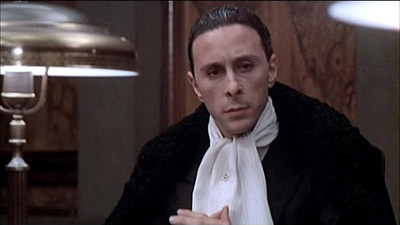
Yes, that's a diamond-encrusted "B" on his cravat. And judging from the costume and hair, it's more likely to stand for "Bela" than "Bert."
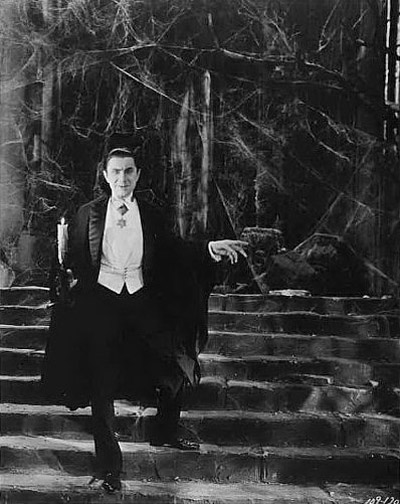
You could read the Nazi sections of the film as intentionally overblown, a counterpart to the more nuanced relationship between Max and Lucia, but the centerpiece of the movie, a flashback of Lucia performing a Marlene Dietrich song in an SS cap ("Wenn Ich Mir Was Wünschen Dürfte,"), is just as unbelievable:
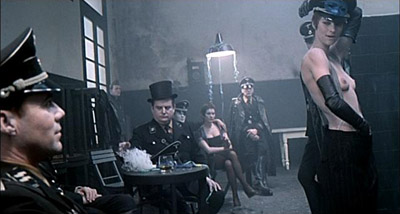
This is probably the best staged scene in the film. But the emphasis is on staged: what is this room? Why is one man wearing a top hat, and another a mask? Even Klaus shows up (his only appearance in the flashbacks), with a date that would have gotten him in trouble with his superiors:
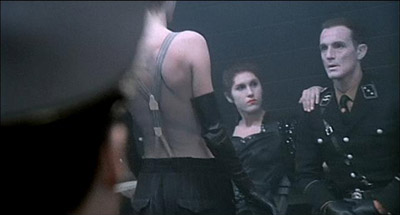
Well, Cavani was hardly the first person to link the SS's death-obsession with sexual adventurism. But the film really has no interest in what's going on in any of its character's heads. The characters aren't living or breathing, they're cardboard cutouts. I have no intrinsic problem with cardboard Nazis: I love the Indiana Jones movies. And I have no intrinsic problem with movies about sadomasochism, or exploitative relationships; I love Lolita as a novel, even if I think both filmed versions have problems (and The Night Porter consciously evokes Lolita: Max repeatedly refers to Lucia as "my little girl," and dresses her in a pink frock). So what's wrong with The Night Porter? Susan Sontag has written very eloquently about sadomasochism and fascism, in a 1975 essay in the New York Review of books:
Between sadomasochism and fascism there is a natural link. "Fascism is theater," as Genet said. As is sadomasochistic sexuality: to be involved in sadomasochism is to take part in a sexual theater, a staging of sexuality. Regulars of sadomasochistic sex are expert costumers and choreographers as well as performers, in a drama that is all the more exciting because it is forbidden to ordinary people. Sadomasochism is to sex what war is to civil life: the magnificent experience. (Riefenstahl put it: "What is purely realistic, slice of life, what is average, quotidian, doesn't interest me." As the social contract seems tame in comparison with war, so fucking and sucking come to seem merely nice, and therefore unexciting. The end to which all sexual experience tends, as Bataille insisted in a lifetime of writing, is defilement, blasphemy. To be "nice," as to be civilized, means being alienated from this savage experience—which is entirely staged.
...
The rituals of domination and enslavement being more and more practiced, the art that is more and more devoted to rendering their themes, are perhaps only a logical extension of an affluent society's tendency to turn every part of people's lives into a taste, a choice; to invite them to regard their very lives as a (life) style. In all societies up to now, sex has mostly been an activity (something to do, without thinking about it). But once sex becomes a taste, it is perhaps already on its way to becoming a self-conscious form of theater, which is what sadomasochism is about: a form of gratification that is both violent and indirect, very mental.
Sadomasochism has always been the furthest reach of the sexual experience: when sex becomes most purely sexual, that is, severed from personhood, from relationships, from love. It should not be surprising that it has become attached to Nazi symbolism in recent years. Never before was the relation of masters and slaves so consciously aestheticized. Sade had to make up his theater of punishment and delight from scratch, improvising the decor and costumes and blasphemous rites. Now there is a master scenario available to everyone. The color is black, the material is leather, the seduction is beauty, the justification is honesty, the aim is ecstasy, the fantasy is death.
Cavani knows the shock value of this "master scenario." But she evokes it so carelessly, and with so little interest in her film's characters, that the end result is not just exploitative, but boring. The Night Porter conflates the after-the-fact, theatrical embrace of Nazi symbols with their historical reality. Bert and Klaus (and Max) are a modern-day sadomasochist's version of Nazis, cartoonishly evil, props in a staged ritual of domination and submission. They're not characters; they're costumes. And yet Cavani wants us to take them so damn seriously.
Randoms:
- Despite The Night Porter's flaws, I should note that Liliana Cavani went on to direct the excellent film adaptation of Ripley's Game. It never got a theatrical release but is available on DVD.
- My girlfriend pointed out that Max's predatory use of a handheld camera is reminiscent of Peeping Tom. The shots of Max filming were actually the best of the flashbacks, I thought—although I don't give the camera the same primeval power that Michael Powell did, I do think that the camera and spotlight work very well to make Max genuinely frightening here.
- The historical inaccuracies in The Night Porter are too numerous to list (and not surprising, given its cartoon Nazis). But just to start, the War Documentation Center is in Amsterdam, not Vienna, and it would have been difficult for Max to have worked in Hungary, where there were no concentration camps.


26 comments:
Two other films in the sadomasochism/fascism vein of the Night Porter came out between 1969 and 1975. Ilsa, She Wolf of the SS, arrived (alas) in theatres a year after Night Porter and lest you think that Nazi chic ineptitude couldn’t get any worse, Don Edmonds provided his audiences with a God awful, exploitive, campy, violent exploration of Nazi fetishism, where the female Kommadant uses men to satisfy her needs and castrates those that fail. Really, no need to say more. 1969’s La Caduta degli dei by Luchino Visconti (coincidentally also starring Dirk Bogarde) considered degenerate sexuality in a German family during the rise of the Nazi party and in many ways is as subtle and nuanced as the Night Porter. Too bad it didn't have musical monacles jumping from eye to eye...
I haven't seen Ilsa, She Wolf of the SS but its lack of pretentiousness about the subject makes it sound less offensive than Night Porter, not more.
Hey there Matthew, someone directed me this way when they heard I was attempting to watch all of the Criterion films too. I've only reviewed around 35 though I've seen closer to 50. Glad to find a kindred soul. I'll keep coming back!
My haphazard list is here.
http://www.organicmechanic.org/criterion/
God damn, I found this page through a reference on cigarettesandredvines.com -and I've got to say -you are the best film critic I think I've ever run across. I love Ebert and Rosenbaum, and the www.filmref.com guy is okay, but jeez... I'm coming here more often.
I guess it helps when you're reviewing the Criterion collection, but still. I'm looking forward to your review of 'Cries and Whispers.'
Anonymous #1, I haven't seen Ilsa: She Wolf of the SS or but I'm with Anonymous #2 on this—it sounds like Don Edmonds knew what kind of movie he was making and didn't pretend he was saying anything profound about the human condition. That counts for a lot, I think, even if the movie's unwatchable. By the way, did you know it was a series? Followed by Ilsa: Harem Keeper of the Oil Sheiks, Ilsa: The Wicked Warden, and finally, Ilsa: The Tigress of Siberia. The Nazi Drew movies.
La Caduta degli Dei sounds more interesting. I don't think it's a coincidence that Dirk Bogarde is in the movie; something about his face just reeks of moral decay. I'll check it out one of these days (I think the first Visconti movie I see will be The Leopard, but since that's Criterion #235, it will be a long, long time...) Susan Sontag mentioned the film dismissively in that essay I linked to:
"This eroticization of fascism can be remarked in such enthralling and devout manifestations as Mishima's Confessions of a Mask and Sun and Steel, and in films like Kenneth Anger's Scorpio Rising and, more recently and far less interestingly, in Visconti's The Damned and Cavani's The Night Porter."
Has anyone seen Confessions of a Mask, Sun and Steel, or Scorpio Rising? Or, for that matter, Ilsa: The Tigress of Siberia?
Anonymous 2, I quite agree.
Adam,
Great to see someone else is attempting this madness! I like your site and reviews and will be adding a link to your site the next time I update it. Good luck!
Matthew,
Thanks! Glad you like the site! If you like this kind of long-form review of a movie, you should do yourself a favor and check out the essays Jim Shepard has been writing for The Believer—I think you'll like his writing. I didn't know the filmref site but will look it over. Re: Cries and Whispers, it'll be a while, but if I stick to one per week, you can look forward to that, um, next summer? Maybe later, given that I'll probably get spectacularly drunk after I've done 100 of these...
Thanks again for the kind words!
Matt
Professays,
I agree that The Night Porter uses its Nazis for shock value. But the movie didn't invent the eroticization of Fascism, it just drew from the same well. The Sontag essay I linked to explores the paradox about eroticising fascism, which you point out: "Why has Nazi Germany, which was a sexually repressive society, become erotic?" No easy answer to that (although Sontag takes a pretty good stab at it). But one thing is certain: The Night Porter doesn't have much to tell us about either fascism or sadomasochism, much less links between the two.
Matt
Wow. The Night Porter has always fascinated me as a film, and admittingly, I've been in a struggle since I saw it wether it was a "good" film or a "bad" one. I have read countless essays, and reviews on the film but none compare to yours, and you have actually swayed me to believe that the film isn't as good as I had hoped. I think my conflict over the film is more due to the ideas the Night Porter briefly suggests in it's general plot, and situation that are very interesting albeit very poorly executed. It made me think , but not necessarily through it's images, script or charactirization... it was the premise and it's consequences as art and a possible thesis on human nature that intrigued me, not the film.
Justine,
Glad you enjoyed the essay. And yeah, I think The Night Porter is a bad execution of a terrific idea. I had high hopes for it; probably the reason this is one of my more vitriolic reviews.
Interesting review, but I'd suggest a re-evaluation of the film; to view it allegorically rather than literally. It is not a drama with complex characters, although it's obvious that you wanted it to be like that and judged it solely by that criteria.
You presume that Cavani meant the scene where Lucia dances to be understood as a realistic event? Where they're wearing masks, bringing prisoners as dates, presenting decapitated heads (since when did the Nazis behead people?). We see several moments from the past mirrored in the present. This isn't a drama with genuine characters but a map of human behavior: our tendency toward repetition, the influence the past has over us, the ease with which we ignore our own faults.
I'm not saying that you should like the film. I'm not even really saying that it's a good film, necessarily (I think it's naive to judge any work of art as merely good or bad, successful or unsuccessful). I just like to suggest that any attempt at art should be viewed on its own terms rather than personal expectations, other artwork, or what the work "should" be.
Anonymous,
It's a fair criticism—I'm a pretty literal-minded guy. And you're right, those scenes are too hallucinogenic to be taken as realism. Perhaps my reaction to the film stems from the sort of holiest-of-holies reverence that the holocaust usually gets in cinema. But you read it as an allegory, without complex or genuine characters? I suppose I do, too. In any event, I'll give it another look.
Google brought me here - surprising that it has never happened before, considering how many films must have been reviewed on this blog. In any case I will take care not to find my way back: I suppose it is admirable to have set out to learn more about "foreign" film; too bad you make a mockery of your own pursuit with a complete lack of both rigour and resourcefulness, which leads to incomprehension, superficial observations, glaring oversights, and foolish conjectures. Perhaps part of the problem is thinking that 15 hours - including, it seems, three viewings of the film - amounts to putting in a lot of work.
I have no particular attachment to The Night Porter - certainly it is flawed, though the substantial flaws escaped you while you were busy triumphantly exposing apparently misplaced monacles. I just think that if one is going to set oneself up as a critic, it is important - in fact it's essential - to be responsible. I also realise that this comment is four years late - but a quick review of recent reviews finds them, four years later, just as irresponsible and just as foolish.
Re: the person who trashes your writing on The Night Porter and other films [Anonymous - Nov 30, 2011]... it may be true that there are oversights and irrelevances but that is often inevitable. Indeed, critics of the film, both in the 1970s and today, overlook several key components of Cavani's narrative, her wilful demolition of her own act structure in the second half of the film, and a host of details that indicate there is more going on here with regard an allegory of Nazism than even Anonymous has probably noted. I have more invested in the film than I have in your blog, but I think somebody should speak up for you here in light of such a personal attack on your writing, your enthusiasm for the films you are viewing, and your attempt at close analysis. Sure you get some things wrong sometimes, but a personal attack of the kind left on Nov 30 is completely uncalled for. It is merely aggressive and intended to do harm. Ignore it.
Incidentally... the person who asks, "since when did the Nazis behead people?" it is well documented and the legal system of the Third Reich permitted the use of the guillotine on thousands of occasions as a means to execute. Beheading was less common in the camps but it did occur.
Dave,
Thanks. There are probably many things in The Night Porter that I missed and might find on subsequent viewings—but I didn't see Anonymous making a case for the film, so, basically, fuck it. I don't take personal attacks from anonymous commenters personally.
Dave,
I would, incidentally, be interested in reading a defense of the film, either here or elsewhere -- is there anything you'd recommend?
Hi Matthew,
Interesting that this thread has become active again at the same time I am moving slowly through the film for a different art purpose (product).
Something I wanted to mention that jumps out with The Night Porter with each viewing. The hair on the lens through the long take of their "reunion" in the hotel room.
It has always thrilled me that a film maker working towards such a beautiful (if pretentious?) work would decide that the take was so good she would continue to include it in the edit.
I would like to know the story behind it.
There is a power in the film...at times silly but still the film has a strange haunting quality.
I remember when I was in theatre school 25 years ago, a crazy Romanian director berated us for dressing like "artists" and lacking any intensity. "Real artists dress like postal clerks!!"
He forced us all into a dark room at school to watch The Night Porter...
"That's passion!!"
The film has since then always been in my past/present mind - like a drive-in blue movie from when I was younger. (a french film that had naked breasts - my two best friends and I, in my father's car). Maybe it's the strange sound quality and the "otherness" of it.
It is so hard for me to be overly critical of the piece. I feel some strange affection for it. Maybe it's just the nostalgia. The Romanian director did make some incredible theatre and still does. His influence continues hangs to over this.
I agree it is more an allegory. I also believe the film is so "open" that it allows room for us to project what we want onto it. In that regard...it continues to validly fascinate me.
Hope all is well.
Liked your post. I just watched it again myself. I didn't dislike as much as you. www.thefashioneaste.com.
Excellent review. Watched this movie and I didn't get much out of it. You're right about the flat characters - there's no real interest in either Max or Lucia no reason to care about what happens to them. For that matter, no meaningful probing of why Lucia finds Max's tortures appealing. If you're going to depict a Holocaust survivor rushing back to an SS guard you'd better explore the issue beyond simple titillation. It's either dull exploitation or a failed art house drama.
Another thought was that this movie seems a riff on The Damned (1969), borrowing the stars, perverse sexuality and melodramatic treatment of Nazism. The difference is that Visconti's film, as lurid and overwrought as much of it is, at least has a coherent plot and distinct characters, not to mention well-crafted set pieces. The Night Porter just has overblown pretensions that it doesn't come close to achieving.
I will definitely check these things out
writing service
Nice post.... Thanks for sharing
UK Essay
Nice stuff on your blog.... Actually I am writing my Assignment Service project and getting important points from different blogs and forums and This is my pleasure to being here on this blog..
Nice pics... Actually I am searching about writing service on different blogs.
شركات تخزين اثاث بالرياض
شركات تنظيف
عزل اسطح
نقل أثاث في الرياض
شركة تنظيف بالرياض
افضل شركات التنظيف في الرياض
شركة تنظيف شقق بالرياض
شركة مكافحة الحشرات بالرياض
شركة تنظيف منازل بالدمام
شركات تنظيف بالدمام
شركة تنظيف فلل بالرياض
تنظيف فلل
افضل شركة تنظيف فلل بالرياض
Well, be that as it may, I liked the movie. Yes you have to suspend belief but isn't that the point of movies? Outside of the monocle thing, really I don't take it quit so literally as the reviewer does and instead what I got out of it was something along the lines of self-destruction and what the cost is of giving in to such impulses and behaviours. That to me is really what's at the heart of this movie and if you take the settings, cliches, and stereotypes as symbolic means to an end instead of actual happenstance (much like the bible actually) the story and it's themes of enslavement, self-loathing, and self-destruction are much easier to digest.
Post a Comment